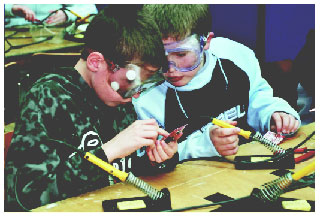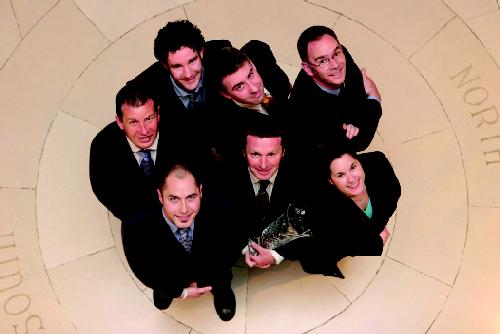| 2006 |

|
YEAR BOOK |
Science Spin
|
The growth of Irish Science
|


Of course, we cannot afford to wait for these little researchers to grow up, and right now the huge investments being made in science are producing an enormous impact. This is being done with a purpose � there are clear strategies, targets to be met, and all this funding is seen as an investment. Thus, the State has to see that this strategy, like the earlier one of attracting in the multinationals, actually works. Earlier this year, one of our ministers, Mary Hanafin, reminded researchers that she, like any other politician, can only continue to defend spending in science, if the public can see concrete results.
However, it is not just all about getting a quick return. There are lots of spin-off benefits. The extra cash, for example, is changing the working environment. Institutions, such as Conway, REMEDI, Tyndall, and CRANN are bringing different areas of science sharply into focus, and the impact of this on overall performance is very high. Many scientists might recall the poor state of marine research before the Marine Institute was established. Now, Ireland is one of the best places in the world to conduct marine research, and at long last we see our enormous marine territory as a massive natural asset rather than a cold barrier separating us from the rest of the world.

Underlying all of this is a clear assumption that science is good for the economy. Given the rapid decline in low-skill manufacturing, the switch is being made to sustainable industries based on home-grown knowledge. There is very good evidence to show that employing higher skills has a positive impact on the way we do business. It is worth noting the amazing success of the former Techstart programme, which was set up originally to match young science and technology graduates to local industrial needs. Unfortunately, this programme was axed because it was seen as an �employment scheme� It was not an employment scheme; it was in fact all about knowledge transfer, but it has an enormous impact on small local firms. The programme was carefully monitored by Enterprise Ireland, and it was found that something like 80 per cent of the graduates remained on as higher paid employees, and, in almost every case, the firms started to expand and make better profits. Significantly, these firms discovered how to innovate, and as we are always being told, firms that innovate will inherit the future.
As is evident from the accounts here in the The Irish Scientist , all the institutions are keen to show how much they have to offer industry, but as IBEC, Enterprise Ireland, and other organisations often point out, the rate of technology transfer into business, particularly Irish owned firms, is much lower than it should be. Getting more graduates into business is undoubtedly the most effective way to solve that problem.
Naturally there are those who question the strong focus on making a financial return. Many scientists are less than happy to see institutes and colleges being run like businesses. Privately, many scientists admit that they are concerned about the continual emphasis on applied research, but they are reluctant to make this an issue, particularly as everyone in the sciences is now floating up on a rising tide. However, many scientists would like to see more of the support going into fundamental research, and they have a powerful case to make for curiosity driven science. The laser, for example, could never have been developed from applied research, and Nicholas Callan in Maynooth was hardly thinking of the electronics industry when he discovered induction.
As one prominent researcher told this writer, this is one of the hottest topics of discussion among university based scientists, but only in private. Academics in search of funds are old hands at making suitable submissions, so, although they might grumble, the good life goes on. That issue is quietly simmering away, and not just in Ireland. With each new EU Framework programme, the research topics eligible for support narrow down, and unless researchers can work with larger result-focused teams, they are simply excluded. This does not suit everyone, and higher level research institutes became so concerned with this trend that through the European Science Foundation, a proposal was put forward last year to have separate funding for �blue-skies� research. One of the significant developments for science this year is that this proposal was accepted, and under the current Framework programme, being rolled out now, funds have been set aside to support curiosity driven research. While critics might scoff at the notion of getting money for research with no pay-back obligations attached, a steering body of distinguished scientists has made it quite clear that they do indeed expect results, but not necessarily those that investors in industry would ask for or expect. In a few years time, when the next Framework programme comes up, it will be interesting to see which approach will have the biggest impact on society.
Tom Kennedy
Editor, Science Spin